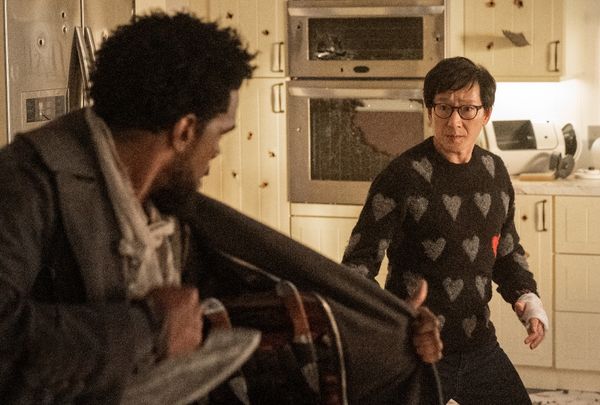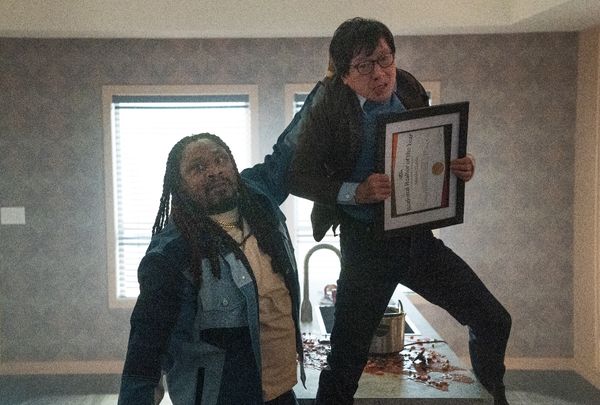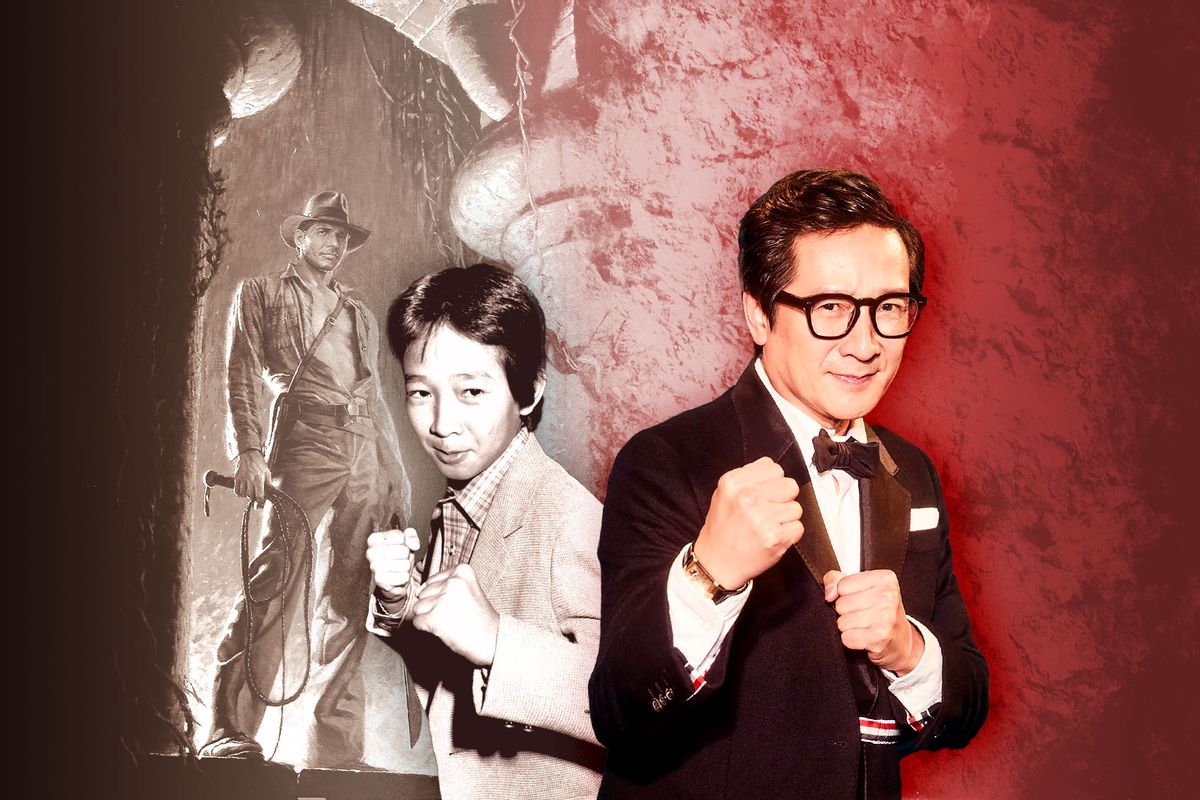"Hey Dr. Jones, no time for love!"
That line, uttered by irrepressible sidekick Short Round in 1984's "Indiana Jones at the Temple of Doom," has endured, even if it didn't end up being true. See, love never died for Ke Huy Quan, who portrayed Indy's precocious sidekick. One might even say the actor's famed Hollywood return could be considered a second chance romance.
Much like the plot of his Oscar-winning comeback "Everything Everywhere All at Once," it's a story that spans time and place, across generations and identities. Both of Quan's '80s film roles — Short Round and then gadget-inventing Data in "The Goonies" — made an indelible mark on the psyches and hearts of young audiences, especially those of Asian descent.
His career comeback took on the breakneck momentum of a runaway mine cart.
"Over the years, so many people have come up to me, especially the AAPI community, telling me what Short Round and Data mean to them," Quan told Salon in an interview at the Beverly Hills' Four Seasons hotel. "A lot of them told me that these characters were the very first characters with an Asian face that they've seen up on the screen. I'm very proud of that because they felt seen."
This is true of Filipino American Jonathan Eusebio, the director of Quan's action comedy-romance "Love Hurts." For the former "John Wick" and "Fall Guy" fight coordinator, putting grown-up Short Round through his paces was an unvoiced desire that was finally realized.
"I watched 'Indiana Jones and the Temple Doom' thousands of times because I saw something that I could relate to," said Eusebio. "He kind of looks like me, he has black hair . . . I can relate to this character in this movie."
Despite a short stint as a gifted student on school sitcom "Head of the Class" and an appearance in caveman comedy "Encino Man," the young Quan largely disappeared from our screens, if not our memories. As soon as he reemerged as the fanny pack-wielding Waymond Wang in the Daniels' 2021 multiverse-hopping actioner "Everything Everywhere All at Once," however, his career comeback took on the breakneck momentum of a runaway mine cart.
Falling in love with Quan all over again was not just a matter of sepia-toned Gen X or Millennial nostalgia; rather, that affection was fueled by a fierce sense of righting a wrong for our childhood screen buddy. He had been forced into early acting retirement by a Hollywood machine that lacked the imagination and willingness to cast a mature Quan, who then subsequently moved behind the scenes to become a stunt actor and coordinator. It wasn't until seeing 2018's all-Asian rom-com "Crazy Rich Asians" that he considered returning to his first career love at the tender middle age of 48. Two weeks after calling up an agent friend, he auditioned for "Everything Everywhere All at Once."
A well-deserved Oscar followed, along with a supporting role in Disney's "American Born Chinese" adaptation, as the voice of a pangolin in "King Fu Panda 4" and as the MCU's Ouroboros in "Loki." Somehow, Quan made his victory lap feel communal as his undeniable enthusiasm and gratitude for his renewed career sparked intense good will. While his comeback story carried a whiff of mourning for what could have been, Quan chose never dwell on the past with bitterness. Instead he's tackled his comeback with the same gusto we see in his bear hug reunions with old co-stars (Indy! Goonies!) and his giddy, open-mouthed selfies pointing to other celebrities.
This golden retriever optimism has rolled into his first leading role in "Love Hurts," in which Quan plays a peppy realtor who bakes heart-shaped cookies for his colleagues. Buried beneath this sunshiny exterior, however, is a killer. Turns out the blazer-wearing Marvin once was a hitman with a body count that rivals his sales numbers.
"What I love about this character is the recognization and the acceptance of what he has done in the past is something that he really regrets," said Quan. "We see him trying to redeem himself and to have this new life, this normal life, where he's not destroying homes, but creating homes.
"A lot of people understand what second chances mean. I understand his headspace, that he wants to be a better man. He's someone who's not afraid to wear his emotions on his sleeve."
The Lover
 Ke Huy Quan in "Everything Everywhere All at Once" (A24)"Love Hurts" is also ostensibly a romantic comedy, as Marvin is pulled back into his hitman past by his old flame Rose (woefully underutilized fellow Oscar winner Ariana DeBose). With this prosciutto-thin premise, the movie spends more time demonstrating how Marvin is a more passionate realtor than he is a lover. It's a shame since as a leading man in a Valentine's Day-pegged film, Quan could've capitalized on the smoldering potential he had shown in the portion of "Everything Everywhere All at Once" inspired by "In the Mood for Love" filmmaker Wong Kar-wai. (Quan had worked as an assistant director on the director's "2046.")
Ke Huy Quan in "Everything Everywhere All at Once" (A24)"Love Hurts" is also ostensibly a romantic comedy, as Marvin is pulled back into his hitman past by his old flame Rose (woefully underutilized fellow Oscar winner Ariana DeBose). With this prosciutto-thin premise, the movie spends more time demonstrating how Marvin is a more passionate realtor than he is a lover. It's a shame since as a leading man in a Valentine's Day-pegged film, Quan could've capitalized on the smoldering potential he had shown in the portion of "Everything Everywhere All at Once" inspired by "In the Mood for Love" filmmaker Wong Kar-wai. (Quan had worked as an assistant director on the director's "2046.")
Beyond that, not much has been seen of Quan's amorous side – although he did have an onscreen makeout session as a teenager on "Head of the Class." But as Eusebio points out, love doesn't need to present itself strictly as the romantic variety.
"Love Hurts" could've been the title of Quan's Hollywood experience.
"Love is a very multifaceted emotion, right?" he said. "It could be the best feeling in the world; it could be the worst. . . . I wanted to show it in its many forms. The most important thing at the end of the day is if [Marvin] loves himself enough to be secure in who he is, and then that love will emanate. You can really love other people if you really love yourself."
With this broader definition of love for self and fellow human, Quan's past roles gain new dimension. In "Goonies," Data and his friends care for their community by saving their homes from demolition. And Short Round is the real beating heart (whether inside or outside a chest) of "Temple of Doom." Not only does he help free fellow child laborers from slavery, but he also saves the life of his friend and mentor Indiana Jones (Harrison Ford) several times, once even tearfully declaring, "I love you, Indy!" in a heartbreaking scene.
"Love Hurts" could've been the title of Quan's Hollywood experience. Witnessing his unwieldy, unfeigned appreciation for his revitalized career drives home just how strong his passion for acting is . . . and how crushing his disappointment must have been for the industry that had turned its back on him.
Perhaps that's why like his '80s characters before him, Quan appears to consistently care about others, not just himself. Having toiled decades behind the scenes and now as a newly minted No. 1 on the call sheet, Quan bore the unspoken responsibility to establish the tone on set.
"I've seen it happen where people would have a really good time when the No. 1 is nice and friendly and welcoming. I've also been on set to where if you have a bad producer or a bad No. 1, then everybody just feels like they're just there for the paycheck, and obviously a horrible feeling to have working on a movie.
"So this time coming into 'Love Hurts,' I knew how important it is, and I wanted to make sure that that the entire cast, no matter what position they are in, what job they have, that everybody feels like part of a big family, and that everything they do is just as important as what I bring to the table."
The Fighter
 Mustafa Shakir as The Raven and Ke Huy Quan as Marvin Gable in "Love Hurts" (Universal Pictures)In the '80s, it was the Hollywood Asian's lot in life to be expected to perform martial arts onscreen. After playing Short Round, Quan embraced the skill by pursuing taekwondo lessons, eventually achieving the rank of second-degree black belt. The detour into stunt work in the U.S. and Hong Kong kept his skills sharp, and the Daniels showcased his expertise with the fanny pack fight in "Everything Everywhere All at Once."
Mustafa Shakir as The Raven and Ke Huy Quan as Marvin Gable in "Love Hurts" (Universal Pictures)In the '80s, it was the Hollywood Asian's lot in life to be expected to perform martial arts onscreen. After playing Short Round, Quan embraced the skill by pursuing taekwondo lessons, eventually achieving the rank of second-degree black belt. The detour into stunt work in the U.S. and Hong Kong kept his skills sharp, and the Daniels showcased his expertise with the fanny pack fight in "Everything Everywhere All at Once."
In ways, "Love Hurts" echoes his scrappy fighting history – both physically and metaphorically in his career — taking on the big guy, or in this case, Hollywood's perceptions of who he could embody.
"This is a different kind of action hero," Quan said. "It's not something that that we have seen the last few decades. This is an action hero who doesn't look threatening at all, but not until the situation calls for it, do we understand, 'Wow, he's truly a bada**.' That was something that was really intriguing to me."
"Even though I didn't always continue to practice martial arts, one thing that I did do over the years was continue to stretch and be flexible."
As with "Temple of Doom," his new film plays off of Quan's shorter stature, pitting him against physically more imposing fighters. This lends itself to the physical comedy in which Quan delivers Jackie Chan-like antics using everyday objects as impromptu weapons while also inspiring more creative choreography that emphasizes his speed and maneuverability.
"I don't know why, but every actor they cast who is fighting me is, like, over 6 feet tall," said Quan with a laugh. "It's very different when you're fighting somebody your size versus fighting somebody like Mustafa [Shakir], who played The Raven, who's 6-foot-4. It takes a lot of creativity to choreograph that first scene [where Marvin fights Raven in the realtor's office] but also to make it so that the audience believes that somebody the size of Marvin Gable is able to take on somebody like Raven or Marshawn Lynch, for example."
Quan carries off the multiple full-scale, acrobatic fight scenes with spry, loose-limbed ease, even though onscreen, Marvin progressively collects wounds as casually as if they're Pokemon. It would be a brutal undertaking for any performer, and taking into account that Quan shot this well after passing his 50th birthday, it's one that few action stars would have taken on as they've aged.
"Even though I didn't always continue to practice martial arts, one thing that I did do over the years was continue to stretch and be flexible," he confided. "Flexibility is a big thing when you do fight sequences like we did for 'Love Hurts' because the type of choreography that we were trying to do, it was important to be able to do them without getting hurt.
"It's muscle memory, but you need to get yourself in shape to do that. So I trained with our action team –– some weights, a lot of cardio, and also constantly working after choreography and making sure I knew them. When you do an action movie like this, it's both not only physically demanding, but also mentally as well too, because knowing the moves is just as important as anything."
The Achiever
 Marshawn Lynch as King and Ke Huy Quan as Marvin Gable in "Love Hurts" (Universal Pictures)Asian characters from the '80s didn't always have to be kung fu masters; sometimes they were nerds who played into the model minority stereotype. Quan's natural effervescence, however, gave his characters an energy and spirit that defied the expectation that these geeks had to be timid or socially awkward. Data screamed till his voice was hoarse alongside his fellow Goonies, and in "Head of the Class," Jonathan Kwong revealed his hormonal humanity beyond academic prowess.
Marshawn Lynch as King and Ke Huy Quan as Marvin Gable in "Love Hurts" (Universal Pictures)Asian characters from the '80s didn't always have to be kung fu masters; sometimes they were nerds who played into the model minority stereotype. Quan's natural effervescence, however, gave his characters an energy and spirit that defied the expectation that these geeks had to be timid or socially awkward. Data screamed till his voice was hoarse alongside his fellow Goonies, and in "Head of the Class," Jonathan Kwong revealed his hormonal humanity beyond academic prowess.
Quan continued this trend with "Loki," in which his smart-mouthed, tech-savvy character Ouroboros is "a variant of Data from 'The Goonies,'" according to his interview with Gold Derby. And now with "Love Hurts," Marvin channels his overachieving tendencies into his second career, earning the title of Regional Realtor of the Year — with the framed certificate to prove it.
Throughout the film and its many skirmishes, Marvin clutches that award to him for dear life, like a cat with a kicker toy. Bodily harm is nothing compared to the invigorating proof that Marvin has found approval and success with his chosen career. It's an attitude that was inspired by Quan's own groundbreaking Academy Award win.
"That was written in for [Ke] because he was explaining about how much the Oscar meant a lot to him," said Eusebio. "For days, he wouldn't let go of it when he first got it because he couldn't believe it."
Quan added, "We added into the script how much Marvin Gable cares about that certificate. And even though it's just a piece of paper, it's a validation of his new life."
On Feb. 3, the actor had a grander and more permanent monument as evidence of his accomplishment: his handprints immortalized in cement at Hollywood's TCL Chinese Theatre. Before the event, Quan told Salon, "I remember when I got that email from my publicist sharing that incredible news with me, I had to read it two times because I thought I was being invited to somebody else's ceremony. Then on the second read, I realized, 'Oh my gosh, it's me. They've given me my own ceremony.'"
Quan can be forgiven for his repeated disbelief — that he was offered the lead role, that he had won an Oscar, that he would be honored in cement. After all, Tinseltown did deny him his dream for decades. But long before this imposter syndrome set in, a piece of Hollywood lore may have given him some reassurance.
According to The Raider, since the character Indiana Jones was named for George Lucas' dog, the "Temple of Doom" screenwriting couple Willard Huyck and Gloria Katz on decided to name Indy's sidekick after their own dog Short Round. The unusual naming convention even made its way to official "Indiana Jones" canon when in "The Last Crusade" it's revealed that the true name of Harrison Ford's character is Henry, Jr. He had adopted the name Indiana from the family dog.
Thus, in a way, Quan's story isn't one of an outsider who proved himself, but rather someone whose earliest signature role shares the same baked-in origins as one of the most iconic characters in screen history. It turns out the love and belonging was there all along, but as with many second chance romances, it just took the right timing and change in circumstances to recognize it.
"Love Hurts" is currently in theaters. Quan next appears in Netflix's "The Electric State," as the voice of a snake in "Zootopia 2" and was recently cast to play a serial killer in the thriller "Bad Boy."



Shares